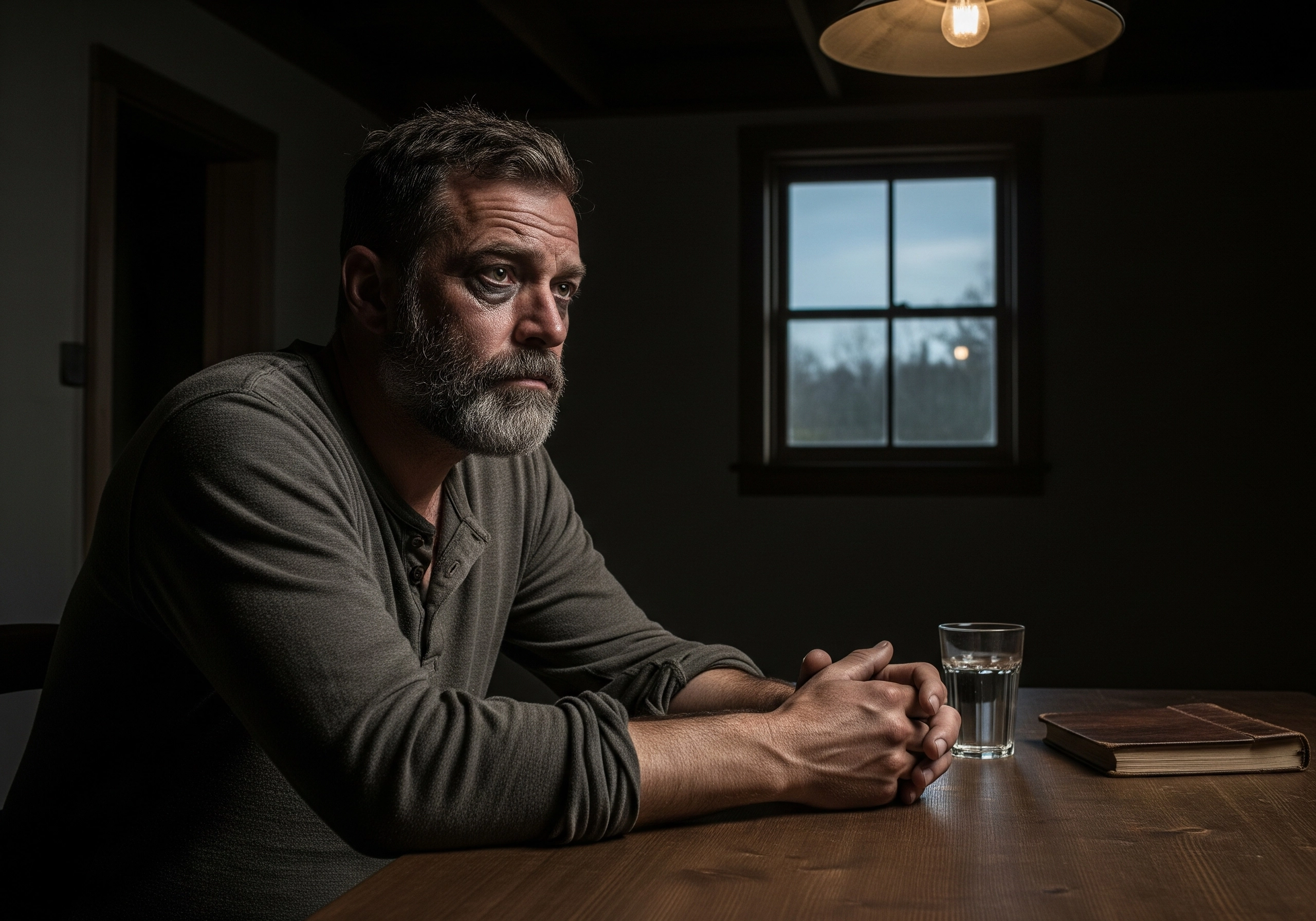The Outdated Instinct to React
For much of history, masculinity has been associated with action: act fast, stay strong, solve problems, dominate situations. While this instinct served men well in times of survival and battle, it has become a double-edged sword in modern society. Today, life’s greatest challenges are rarely physical fights — they’re emotional, relational, and psychological.
And yet, many men still respond to stress, conflict, or vulnerability as if they’re in a battlefield. They go into “fight mode” — raising their voice, shutting down emotionally, or trying to control the situation. It’s not because they’re aggressive by nature. It’s because they’ve been taught that reacting with power is how you stay safe and respected.
But in an emotionally complex world, this instinct often backfires. It strains relationships, creates unnecessary conflict, and leads to inner turmoil. The modern man doesn’t need to fight to prove himself. He needs to reflect — to respond instead of react, to understand before acting. That’s where emotional intelligence becomes not just helpful, but essential.
What Is Emotional Intelligence, Really?
Emotional intelligence, often shortened to EQ, is the ability to recognize, understand, manage, and express your emotions — and to do the same with others. It’s not about being overly emotional or soft-spoken. It’s about mastering your internal world so you can move through external situations with clarity and confidence.
The key components of emotional intelligence include:
- Self-awareness – Knowing what you’re feeling and why.
- Self-regulation – Managing your emotions rather than being controlled by them.
- Motivation – Staying driven by values, not ego or impulse.
- Empathy – Understanding what others are feeling, even if they don’t say it.
- Social skills – Navigating relationships with communication, respect, and tact.
For men, developing emotional intelligence often feels like entering unfamiliar territory. But it’s not about abandoning masculinity — it’s about expanding it.
Why “Fight Mode” Is Failing Men
Fight mode isn’t just about aggression. It’s about defensiveness, control, withdrawal, or trying to “fix” everything instead of sitting with discomfort. It’s an ancient response to perceived threat — whether that threat is physical or emotional.
In modern relationships, fight mode shows up as snapping during arguments, dismissing your partner’s feelings, refusing to admit fault, or avoiding emotional conversations altogether. At work, it might look like micromanagement, competition without collaboration, or resisting feedback. Internally, it creates a constant state of tension — because you’re always bracing for the next challenge instead of processing the current one.
This emotional armor may have helped men survive in the past. But today, it prevents many from thriving. Relationships break down. Communication suffers. The mind becomes a battlefield. And worst of all — emotional wounds go untreated because there’s no space to reflect, express, or heal.
From Surviving to Understanding
Transitioning from fight mode to reflect mode is not about passivity — it’s about emotional mastery. Reflection doesn’t mean weakness. It means taking a breath before responding. It means understanding the story behind the anger or anxiety. It means asking yourself not “How do I win this?” but “What’s really happening here?”
This shift starts with pausing. Most men are trained to jump into action, but few are taught to pause. That pause is where emotional intelligence begins. It’s the space where you notice, name, and navigate your emotions rather than being ruled by them.
For example, instead of lashing out when you feel criticized, you pause and recognize that the criticism triggered shame from a past experience. Instead of shutting down during conflict, you notice that you’re feeling overwhelmed and communicate that. These are small moments, but they create big changes.
Emotional Intelligence Is Learned, Not Inherited
The idea that some people are just “more emotional” or “less emotional” is misleading. Emotional intelligence is a skill — and like any skill, it can be learned, practiced, and improved. Most men were simply never given the tools or language to develop it.
Think of emotional intelligence like training a muscle. At first, it feels awkward. You might not even know what you’re feeling, let alone how to express it. But the more you practice — through journaling, therapy, honest conversations, or self-reflection — the stronger it gets.
Emotional intelligence doesn’t require you to become someone else. It just helps you become more in tune with your full self — not just the parts that perform, protect, or power through.
The Hidden Power of Self-Awareness
Everything begins with awareness. If you don’t know what you’re feeling, you can’t change how you respond. Many men spend years feeling “off” — frustrated, disconnected, restless — but they don’t know why. Emotional intelligence gives you the tools to decode those feelings instead of being hijacked by them.
Self-awareness doesn’t just help with emotional regulation — it also boosts confidence. When you know your triggers, values, and emotional patterns, you make better decisions. You set healthier boundaries. You stop being reactive and start being proactive.
This clarity translates into every part of life: relationships, parenting, leadership, and even physical health. The body is often the first place emotion shows up — tight chest, clenched jaw, fatigue. Learning to listen to these signals is part of becoming more emotionally intelligent.
Empathy Without Losing Yourself
One fear some men have is that emotional intelligence will make them too sensitive or emotionally vulnerable to others’ needs. But empathy isn’t about absorbing other people’s emotions — it’s about understanding them.
You can be empathetic without losing your boundaries. In fact, empathy allows for clearer communication, deeper relationships, and better conflict resolution. It doesn’t mean saying yes to everything or being walked on. It means listening with presence, validating without fixing, and holding space without judgment.
This is especially important in relationships, where emotional disconnect is one of the leading causes of breakdowns. A man who can hear his partner’s feelings without defensiveness — and express his own without shame — brings stability and trust to the relationship.
Learning to Respond, Not React
One of the core principles of emotional intelligence is learning the difference between a reaction and a response. A reaction is instinctive, immediate, and often defensive. A response is intentional, measured, and guided by self-awareness. This shift — from reaction to response — is where growth happens.
For many men, reacting has become a default. A disagreement leads to raised voices. A setback at work leads to withdrawal or irritability. A difficult conversation triggers the need to “fix” rather than listen. These reactions often stem from a fear of being exposed, rejected, or seen as incompetent.
But with reflection, those automatic impulses can be slowed. Before reacting, ask yourself:
- “What am I really feeling right now?”
- “What part of me is being activated — pride, shame, fear, hurt?”
- “What response will reflect my values, not just my emotions?”
Taking even 30 seconds to breathe, check in with yourself, and choose your next move consciously is a powerful act of emotional maturity.
The Importance of Naming Emotions
Many men grew up with only a limited set of acceptable emotions: anger, pride, maybe happiness. Everything else was seen as weakness, confusion, or noise. But being able to name your emotions is key to understanding them — and shifting out of fight mode.
Emotional granularity — the ability to distinguish between feelings like frustration vs. disappointment, or sadness vs. shame — helps men navigate life with more clarity. When you can name what you’re feeling, you’re no longer at the mercy of it. Instead, you can work with it, express it, and move through it.
This doesn’t require poetic language or therapy jargon. Simple statements like “I feel rejected,” “I feel unimportant,” or “I’m afraid of losing control” are brave and effective. They open doors for real dialogue, especially in moments of conflict or vulnerability.
Practicing Reflection in Real-Life Situations
Reflection is a practice — not a personality trait. The more you do it, the more natural it becomes. And it starts with everyday moments:
- In relationships: Instead of shutting down when your partner brings up a concern, try saying, “I’m listening. Give me a moment to process that.” Or if you feel defensive, admit it: “I’m feeling defensive, but I want to understand.” That honesty builds trust.
- At work: When you receive criticism or feel overwhelmed, take a breath. Ask for time to regroup or clarify. Don’t respond in the heat of the moment — give yourself space to think about the message, not just the delivery.
- In parenting: If your child is upset, resist the urge to immediately correct or dismiss. Kneel down, make eye contact, and ask, “Can you help me understand what you’re feeling?” This models empathy and teaches your child that emotions aren’t shameful.
Every moment of reflection strengthens your emotional intelligence. It shifts your identity from a man who reacts out of pressure to one who responds with presence.
Integrating Emotional Intelligence with Masculine Values
There’s a myth that emotional intelligence is in conflict with masculinity. But the truth is, they complement each other — when redefined. Courage, responsibility, loyalty, and resilience are all masculine traits that thrive when paired with emotional intelligence.
- Courage becomes not just physical bravery, but emotional vulnerability.
- Responsibility includes managing your inner world, not just external duties.
- Loyalty extends to being loyal to your own needs and boundaries.
- Resilience means bouncing back not by ignoring emotions, but by processing them.
This integration allows men to honor their masculine identity while expanding their emotional range. It also sets a powerful example for others — that strength isn’t diminished by emotional expression, but deepened by it.
Building Emotionally Intelligent Relationships
Relationships are one of the best arenas to apply and grow emotional intelligence. But they also expose our emotional blind spots. Partners often mirror back what we’re avoiding: fears of inadequacy, rejection, or loss of control. Instead of seeing this as conflict, emotionally intelligent men view it as an opportunity for connection.
In practice, this means:
- Listening more than defending.
- Asking clarifying questions instead of making assumptions.
- Taking responsibility for your impact, even if your intention was good.
- Expressing your needs clearly instead of expecting mind-reading.
When you apply these skills, your relationships don’t just survive — they evolve. You and your partner grow together, not apart. Emotional safety becomes the foundation for intimacy, passion, and long-term trust.
Healing the Inner Boy
Many men carry unprocessed wounds from childhood — moments when they were told to toughen up, stop crying, or suppress their needs. These messages form the basis of the emotional patterns that surface in adulthood.
Reflection gives you a chance to meet that younger version of yourself with compassion. Maybe he needed comfort instead of criticism. Maybe he needed guidance instead of silence. By acknowledging and validating those unmet needs, you begin to parent yourself in ways you never received.
This isn’t about blaming your past — it’s about reclaiming your emotional agency. Healing the inner boy allows the adult man to lead with self-trust and emotional clarity.
Tools That Support the Shift
Making the move from fight mode to reflect mode isn’t something you do alone. There are countless tools and practices that can help support this journey:
- Therapy: Whether talk therapy, group sessions, or trauma-informed coaching, professional support can accelerate your growth.
- Mindfulness meditation: Helps create space between thought and reaction.
- Journaling: A simple way to process feelings and gain insight.
- Men’s groups: A supportive space to share, reflect, and be challenged.
- Podcasts and books: Titles like The Way of the Superior Man, No More Mr. Nice Guy, or Permission to Feel can offer new frameworks.
There’s no one-size-fits-all path — but there is always a next step. What matters is that you begin.
The New Definition of Strength
Modern strength isn’t measured by how much you can suppress, but by how much you can hold — with awareness, balance, and grace. It’s being able to sit with your partner’s pain without trying to fix it. It’s admitting when you’re wrong and making it right. It’s choosing presence over pride, listening over lecturing.
The man who leads with emotional intelligence doesn’t lose respect — he earns it. He becomes the kind of father who raises emotionally secure kids, the kind of partner who creates lasting intimacy, the kind of leader people want to follow.
He becomes a man who doesn’t need to dominate the room to feel powerful — because he’s already in command of himself.




